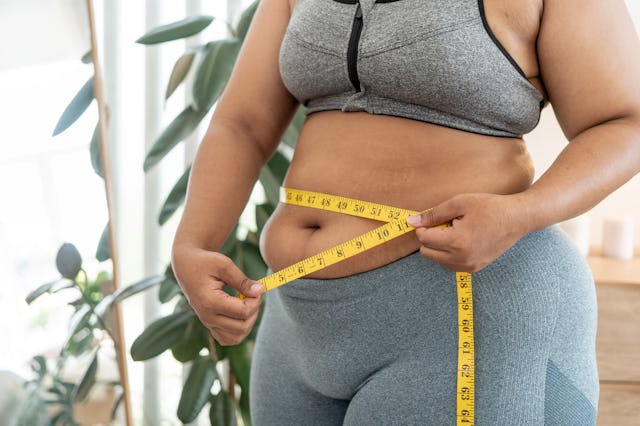Why A “Bounce-Back” Body Is Total BS, According To Literal Doctors
Time to dispel the toxic myth.

Before going through pregnancy myself, I remember thinking the idea of "bouncing back" postpartum was ridiculous. After growing a *human* in you for 40+ weeks, it seemed absolutely ludicrous to believe your body could ever immediately go back to how it was pre-pregnancy moments after giving birth.
And yet, despite being a cheerleader for other women navigating their new bodies postpartum, I quickly found that I wasn't giving my own body the same level of understanding. After having a C-section, I was slightly horrified to look at myself in the mirror and see someone I did not recognize staring back.
The rational part of me knew that I was setting myself to an impossible standard, but that didn't stop the negative self-talk from creeping in, urging me to do whatever I could to get my body back to a shape I recognized.
So, I turned to an expert on the subject. I spoke with Dr. Sarah de la Torre, a Board Certified OBGYN at Joylux, about the idea behind a "bounce back" body post-pregnancy, and why people experiencing postpartum can feel such pressure to immediately return to their pre-pregnancy bodies.
The Pressure of "Bouncing Back" Postpartum
"The pressure that new mothers often feel to 'bounce back' to their pre-pregnancy body can be very challenging and contribute to feelings of self-doubt and inadequacy," says De la Torre. She continued, "Many new mothers struggle with body image issues and the pressure to 'bounce back.' It's important to remember that you are not alone in this and to seek support from others."
She's certainly not wrong about being alone in this way of thinking. According to a 2014 review of pregnancy and body image studies, "Pregnancy-related physical changes can have a significant impact on a woman's body image." The study concluded that "women have unrealistic expectations for their postpartum body" and that "body dissatisfaction dominated the postpartum period."
And how could we not feel this way when it feels like every celebrity on social media has erased all visible signs of pregnancy a week after giving birth? A 2015 study examined how Australia's leading women's magazines portray the postpartum body. The study found that "the social messages inherent in the magazine stories were that women need to strive towards regaining a pre-pregnant body shape with the same effort one would employ when recovering from an illness."
Despite getting pressure in seemingly every direction, De La Torre stressed how vital it is to fight the comparison urge when it comes to your postpartum journey. "It's easy to compare yourself to other new mothers or celebrities who seem to have bounced back quickly after pregnancy. However, it's important to remember that everyone's body is different and that there is no one 'right' way to look after having a baby."
Tips for Practicing Self-Care Postpartum
So, what can be done to fight against this pressure to achieve a seemingly impossible goal?
"The postpartum period is a tumultuous time with huge amounts of change, responsibility, and healing," says De La Torre. "It is emotionally and physically challenging."
With that in mind, she shared a few essential factors to remember:
- Set realistic expectations and practice self-care: Having realistic expectations for your body postpartum is vital. Remember that it took nine months to grow a baby, so it's going to take time for your body to adjust and heal. Taking care of yourself is crucial during this time.
- Challenge negative self-talk: When you notice yourself having negative thoughts about your body, challenge them by asking yourself if they're really true or helpful. Try to reframe them in a more positive light.
- Focus on the positive: Instead of focusing on what you don't like about your body, try to focus on the amazing things it has accomplished. Your body has grown and delivered a baby, which is an incredible feat.
- Surround yourself with positive influences: Surround yourself with people who uplift and support you. Avoid negative influences that make you feel bad about yourself.
- Seek professional help: If you're struggling with body image issues or postpartum depression, it's imperative that you seek professional help. Talk to your doctor or a mental health professional to get the support you need.
Along those same lines of advice, "It's important to be kind to yourself during this time. Instead of criticizing yourself, try to focus on self-care and self-love. This could include things like taking a relaxing bath, practicing yoga, or indulging in a favorite hobby," De La Torre shares.
There may be no magic words to miraculously erase any low self-esteem or self-doubt that seems to creep in about our new bodies postpartum. I know I'm ten months into the journey, and I still have my good days and bad days when it comes to my relationship with my body. But I'll be taking the doctor's orders going forward, and practicing self-love and kindness to remember that my body did an incredible thing. So, the idea of that "bounce back" body? Yeah, that's total BS.
This article was originally published on